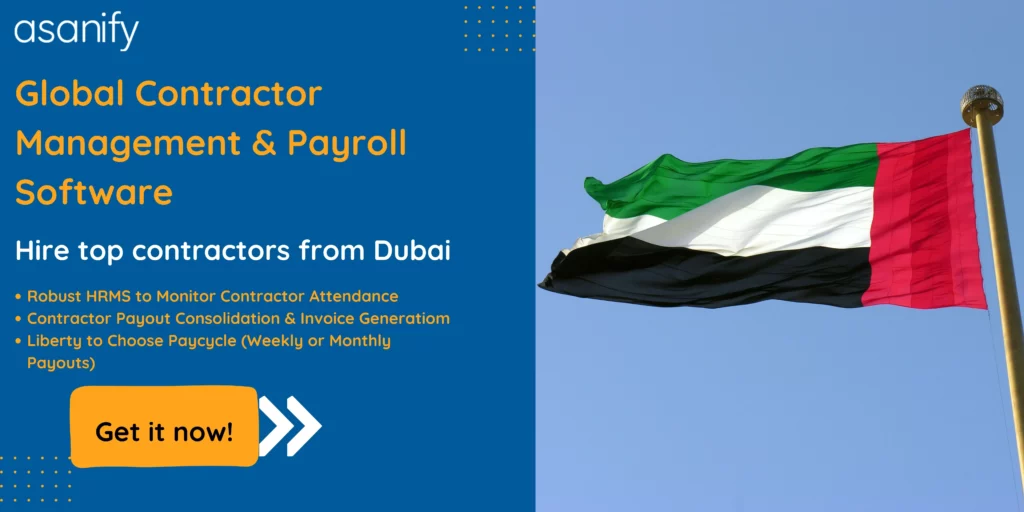Dubai, with its thriving business ecosystem and booming construction industry, has become a hotspot for contractors seeking opportunities. If you are planning to hire and pay contractors in Dubai, it is crucial to understand the legalities involved and ensure smooth operations. In this comprehensive guide, we will walk you through the process of hiring and paying contractors in Dubai, covering everything from classification and agreements to taxation and termination terms.
Contents
- Who is an Independent Contractor in Dubai?
- How is an independent contractor in Dubai different from an Employee?
- Penalties for Contractor and Employee misclassification in Dubai
- What are the Labor Laws in Dubai?
- Steps to Hire a Contractor in Dubai
- Important Considerations for Hiring and Managing Contractors in Dubai
- How to draw up an independent contractor agreement in Dubai
- Do’s and Don’ts of Designing an Independent Contractor Agreement to Hire and Pay Contractors in Dubai
- How Payroll Works When You Move Ahead to Pay Contractors in Dubai
- Tax Filing Requirements for Contractors in Dubai
- Minimum Wages for Contractors in Dubai
- Best Ways to Pay Contractors in Dubai
- Currency and Other Considerations to Pay Contractors in Dubai
- Tax and Other Payroll Costs for Contractors in Dubai
- Termination or extension terms for independent contractors in Dubai
- Quick Wrap Up
- Frequently Asked Questions
Who is an Independent Contractor in Dubai?
An independent contractor is an individual who provides services to a company or an individual on a contractual basis. Unlike employees, independent contractors work independently and don’t enjoy employee benefits such as paid leave, health insurance, or end-of-service benefits. They typically have their own tools, equipment, and expertise to deliver the agreed-upon services.
In Dubai, the concept of independent contracting has gained significant popularity in recent years. With the city’s thriving business environment and entrepreneurial spirit, many individuals are opting to work as independent contractors rather than traditional employees. This shift in the employment landscape has opened up new opportunities for both businesses and individuals.
Salient Features of Being an Independent Contractor in Dubai
- Contractors have the freedom to choose their own working hours and projects, allowing them to maintain a better work-life balance. They can take on multiple clients simultaneously, diversifying their income streams and expanding their professional network.
- Independent contractors in Dubai have the opportunity to earn a higher income compared to traditional employees. Since they are not bound by fixed salary structures, contractors can negotiate their rates based on their skills, experience, and the complexity of the project. This allows them to maximize their earning potential and achieve financial independence.
- Another benefit of being an independent contractor in Dubai is the ability to work on diverse and exciting projects. Contractors have the freedom to choose the type of work they want to undertake, whether it’s in their area of expertise or a new field they want to explore. This variety of work keeps contractors engaged and motivated, fostering continuous learning and professional growth.
However, it’s important to note that being an independent contractor in Dubai also comes with its own set of challenges. Contractors are responsible for managing their own taxes, insurance, and other legal obligations. They need to stay updated with the local laws and regulations governing independent contracting to ensure compliance and avoid any legal issues.
Overall, the role of an independent contractor in Dubai is an attractive option for individuals seeking flexibility, higher income potential, and diverse work opportunities. With the right skills, experience, and a proactive approach, independent contractors can thrive in Dubai’s dynamic business landscape and contribute to the city’s continued growth and success.
Suggested Read: Pay Contractors in Australia- The Ultimate Hiring Guide
How is an Independent Contractor in Dubai Different from an Employee?
Understanding the distinction between independent contractors and employees is essential in Dubai’s business landscape. While both play crucial roles in the workforce, their legal status and working arrangements differ significantly.
Nature of Contract
When it comes to employment in Dubai, employees work under an employment contract, which outlines their rights, responsibilities, and terms of employment. This contract establishes a clear employer-employee relationship, where the employer has direct control and supervision over the employee’s work.
On the other hand, independent contractors in Dubai operate under a service contract, which defines the scope of work they need to perform. Unlike employees, contractors have more autonomy and flexibility in how they carry out their tasks. They are not subject to direct supervision and have the freedom to determine their own working hours and methods.
Benefits and Protections
Another important distinction lies in the benefits and protections offered to employees versus independent contractors. Employees are entitled to various benefits, such as health insurance, paid leave, and end-of-service gratuity. These benefits are mandated by the labor laws in Dubai and are designed to ensure the well-being and security of employees.
Independent contractors, on the other hand, are not eligible for employee benefits. Since they are considered self-employed, they are responsible for their own health insurance and retirement plans. While this may seem like a disadvantage, contractors often have the opportunity to negotiate higher rates for their services, which can offset the absence of traditional employee benefits.
Nature of Work & Level of Control
Furthermore, the distinction between employees and independent contractors is not solely based on the presence or absence of a contract. The nature of the work and the level of control exerted by the employer are also crucial factors. If an individual works exclusively for one employer, follows a set schedule, and is subject to direct supervision, they are more likely to be classified as an employee rather than an independent contractor.
It is important for businesses in Dubai to accurately classify their workers to avoid misclassification, as this can lead to legal consequences. Further, misclassifying employees as independent contractors can result in penalties, fines, and potential lawsuits. Therefore, it is advisable for employers to consult legal professionals or labor experts to ensure compliance with the applicable laws and regulations.
In conclusion, the distinction between independent contractors and employees in Dubai is significant. While employees work under an employment contract, are subject to supervision, and receive employee benefits, independent contractors operate under a service contract, have more flexibility in their working arrangements, and are responsible for their own benefits. Understanding these differences is crucial for both employers and workers to navigate the legal landscape and ensure compliance with labor laws in Dubai.
Recommended Read: Pay Contractors in Philippines- The Ultimate Hiring Guide
Penalties for Contractor and Employee Misclassification in Dubai
Misclassifying employees as independent contractors or vice versa can result in serious penalties in Dubai. Employers can face fines, administrative penalties, and even legal action if found guilty of misclassification. To avoid such risks, it is essential to correctly classify workers according to their employment status and comply with the relevant legal requirements.
When it comes to misclassification, the Dubai government takes the matter seriously. The penalties imposed are designed to deter employers from engaging in such practices and to protect the rights of workers. The consequences of misclassification can be severe, affecting not only the employer but also the employees involved.
Imposition of Fines
One of the most common penalties for misclassification is the imposition of fines. These fines can vary depending on the severity of the violation and the number of employees affected. In some cases, the fines can reach significant amounts, causing financial strain on the employer and potentially impacting their business operations.
Administrative Backlash
In addition to fines, employers may also face administrative penalties. These penalties can include the suspension or revocation of licenses, permits, or certifications necessary for conducting business in Dubai. Losing these essential credentials can have far-reaching consequences for the employer, affecting their reputation and ability to operate legally in the city.
Legal Action
Misclassification can lead to legal action. Employees who have been misclassified may file lawsuits against their employers seeking compensation for unpaid wages, benefits, and other entitlements. These legal proceedings can be time-consuming, costly, and damaging to the employer’s reputation.
It is crucial for employers to understand the criteria for classifying workers correctly. Factors such as the level of control exercised over the worker, the method of payment, and the nature of the work performed are all essential considerations in determining whether an individual should be classified as an employee or an independent contractor.
Complying with the relevant legal requirements is not only necessary to avoid penalties but also to ensure fair treatment of workers. By correctly classifying employees, employers can provide them with the benefits and protections they are entitled to under the law, such as paid leave, social security contributions, and access to healthcare.
It is advisable for employers to seek professional advice to ensure compliance with the classification requirements and to establish proper contracts and agreements with workers. By doing so, employers can minimize the risk of misclassification and the associated penalties, while also fostering a positive and legally compliant work environment.
Suggested Read: Employee Misclassification Guide- The Key to Avoiding Hefty Penalties
What are the Labor Laws in Dubai?
In Dubai, the UAE Labor Law holds sway over all the employment related matters. It lays down provisions related to diverse aspects of collective worker welfare. Some of these are:
- Employment contracts and rights;
- Working hours, rest periods, and overtime;
- Wage protection;
- Health and safety regulations
Employees in Dubai are subject to certain minimum employment standards as specified in Federal Labor Law No. 8. On the other hand, engaging contractors in Dubai entails drafting an independent contractor agreement as the work will be completed as per the various terms mentioned in it. Therefore, the agreement between employers and contractors fall outside the scope of the labor law, as applicable to employees in the UAE.
Benefits such as leaves, insurance, etc. are reserved only for employees in Dubai. Independent contractors may choose to obtain private insurance that needs to be clearly stated in the independent contractor agreement.
The dictum in Dubai is that employees ought to be paid at least once a month via the Wages Protection System supervised by the Ministry of Human Resources and Emiratisation or MOHRE. By contrast, independent contractors can obtain payments once they have delivered the work. Further, they have the liberty to set a particular payment frequency, say weekly or bi-weekly, etc. Whatever the payment cycle is, there needs to be a mention of it in the independent contractor agreement signed by the employer and the freelancer.
Also Read: EOR India- A Detailed Guide on Employer of Record
Steps to Hire a Contractor in Dubai
When hiring a contractor in Dubai, it is important to follow a systematic approach to ensure a smooth onboarding process. Here are the key steps to take:
Step 1: Identify your needs- Clearly define the scope of the project or services you require.
Before you begin the process of hiring a contractor in Dubai, it is crucial to have a clear understanding of your needs. Take the time to assess the specific requirements of your project or the services you require. This will help you communicate your expectations effectively to potential contractors and ensure that you find the right fit for your needs.
Step 2: Search for contractors- Utilize reputable online platforms, professional networks, and referrals to find potential contractors.
Once you have a clear idea of your needs, it’s time to start searching for contractors. Dubai offers a wide range of resources to help you find potential candidates. Utilize reputable online platforms that specialize in connecting clients with contractors. Additionally, tap into your professional network and seek recommendations from colleagues or friends who have previously hired contractors in Dubai. Moreover, referrals can often lead you to trustworthy and reliable professionals.
Step 3: Evaluate qualifications- Review the contractors’ profiles, experience, expertise, and track record.
When you have a list of potential contractors, it’s essential to evaluate their qualifications. Take the time to review their profiles, paying close attention to their experience, expertise, and track record. Look for contractors who have a proven history of successfully completing projects similar to yours. This will give you confidence in their ability to deliver the desired results.
Step 4: Request proposals- Invite selected contractors to submit proposals outlining their approach, timeline, and cost.
After narrowing down your list of potential contractors, it’s time to request proposals. Reach out to the selected candidates and invite them to submit detailed proposals outlining their approach to the project, estimated timeline, and cost. This will give you a better understanding of how each contractor plans to execute the work and allow you to compare their proposals side by side.
Step 5: Interview and select- Conduct interviews to assess contractors’ compatibility and select the most suitable candidate.
Once you have received the proposals, it’s important to conduct interviews with the shortlisted contractors. This step allows you to assess their compatibility with your project and gauge their communication skills. During the interviews, ask relevant questions to understand their working style, problem-solving abilities, and how well they align with your project goals. Based on these interviews, you can make an informed decision and select the most suitable candidate.
Step 6: Negotiate and sign the agreement- Define the terms and conditions, including project milestones, payment terms, and intellectual property rights.
Before finalizing the hiring process, it is crucial to negotiate and sign a comprehensive agreement with the chosen contractor. This agreement should clearly define the terms and conditions of the project, including project milestones, payment terms, and intellectual property rights. Further, it is essential to have a legally binding document that protects both parties’ interests and ensures a smooth working relationship throughout the project.
You may like to check out: Foreign Independent Contractors- Guide to Best Practices
Important Considerations for Hiring and Managing Contractors in Dubai
When hiring and managing contractors in Dubai, there are several crucial factors that you need to keep in mind in order to ensure a smooth and successful working relationship. These considerations go beyond the basic requirements and delve into the intricacies of working with contractors in this dynamic city.
Local Laws and Regulations
One of the first factors to consider is the local regulations that govern contractors in Dubai. It is essential to familiarize yourself with the laws and regulations that pertain to contractors, including licensing requirements and visa regulations. Understanding these regulations will not only help you ensure compliance but also protect your business from any legal complications that may arise.
Insurance Coverage
It is crucial to ensure that the contractors you hire have adequate liability insurance to protect against potential risks. This insurance coverage will not only safeguard your business but also provide peace of mind knowing that you are protected in case of any unforeseen circumstances.
Performance Monitoring
Performance monitoring is another key aspect of managing contractors effectively. It is essential to establish clear performance metrics and expectations from the outset. By setting measurable goals and objectives, you can monitor and evaluate the contractors’ work effectively. Regular performance reviews and feedback sessions can help identify areas for improvement and ensure that the contractors are delivering the expected results.
Proper Communication
Communication is paramount when it comes to successfully managing contractors in Dubai. It is crucial to maintain regular and open communication channels with contractors to ensure alignment and address any issues promptly. Effective communication will help establish a strong working relationship, foster collaboration, and ensure that everyone is on the same page.
Cultural Diversity
It is worth considering the cultural nuances and diversity that exist in Dubai. The city is a melting pot of different nationalities and backgrounds, which can bring a unique set of challenges and opportunities when working with contractors. Being aware of and respecting cultural differences can help create a harmonious working environment and foster better collaboration.
Designing a Proper Contract
Lastly, it is essential to have a well-defined contract in place when hiring contractors in Dubai. This contract should clearly outline the scope of work, deliverables, timelines, payment terms, and any other relevant details. A comprehensive contract will help mitigate any potential misunderstandings or disputes that may arise during the course of the project.
In conclusion, hiring and managing contractors in Dubai requires careful consideration of various factors. By familiarizing yourself with local regulations, ensuring adequate insurance coverage, establishing clear performance metrics, maintaining open communication channels, respecting cultural differences, and having a well-defined contract, you can set the stage for a successful working relationship with contractors in this vibrant city.
Suggested Read: How to Pay Contractors in Your Business? The Ultimate Guide
How to Draw up an Independent Contractor Agreement in Dubai
Creating a comprehensive independent contractor agreement is essential to protect both parties involved. The agreement should outline the scope of work, payment terms, confidentiality clauses, intellectual property rights, and termination conditions. Seeking legal advice to ensure compliance with local laws and regulations is a prudent thing to do.
Do’s and Don’ts of Designing an Independent Contractor Agreement to Hire and Pay Contractors in Dubai
Do’s
1. Clearly Define Scope of Work
Specify the services the contractor will provide, including details such as deliverables, milestones, and project timelines.
2. Payment Terms
Clearly outline the compensation structure, including rates, invoicing details, and any additional expenses the contractor may be entitled to.
3. Term and Termination
Clearly state the contract duration and conditions under which either party can terminate the agreement. Further, make sure to include any notice periods required.
4. Intellectual Property Rights
Clearly define who owns the intellectual property created during the contract. Moreover, specify if the contractor retains any rights and under what conditions.
5. Confidentiality Clause
Include a confidentiality agreement to protect sensitive information, ensuring that the contractor doesn’t disclose or use confidential data for personal gain.
6. Insurance Requirements
Specify any insurance coverage the contractor must maintain during the engagement, especially if the work involves potential risks.
7. Compliance with Laws
Ensure the agreement complies with local laws and regulations in Dubai. Seek legal advice to make sure all relevant aspects are covered.
8. Dispute Resolution
Clearly outline a dispute resolution process, specifying whether disputes will be resolved through arbitration, mediation, or other methods.
Don’ts
1. Ambiguous Language
Avoid using vague or ambiguous terms. Clearly articulate expectations to prevent misunderstandings.
2. Ignoring Local Regulations
Don’t neglect the specific legal requirements and regulations governing independent contractor agreements in Dubai. Stay compliant with local labor laws.
3. Excessive Control
Be cautious not to exert too much control over the contractor’s work, as this could blur the line between an independent contractor and an employee, potentially leading to legal issues.
4. Overlooking Taxes
Don’t disregard tax implications. Clearly state the contractor’s responsibility for taxes and ensure compliance with tax regulations in Dubai.
5. Omitting Indemnity Clause
Neglecting to include an indemnity clause could leave your business vulnerable. Clearly define each party’s responsibility for any potential legal issues.
6. Ignoring Non-Compete Agreements
If applicable, include a non-compete clause to prevent the contractor from competing with your business during and after the contract period.
7. Incomplete Payment Details
Don’t leave payment terms vague. Specify how and when payments will be made, including any milestones or benchmarks that trigger payment.
8. Ignoring Changes in Scope
Clearly outline the process for handling changes in the scope of work to avoid disputes and additional costs down the line.
Recommended Read: Independent Contractor Agreement for USA
How Payroll Works When You Move Ahead to Pay Contractors in Dubai
When it comes to paying contractors in Dubai, understanding the payroll process is essential. Unlike employees, contractors are not included in the regular payroll system. Instead, they are usually paid based on the terms and conditions mentioned in the independent contractor agreement. Payments can be made based on project milestones, hourly rates, or fixed fees.
Tax Filing Requirements for Contractors in Dubai
As an employer, it is important to be aware of tax filing requirements related to contractors in Dubai. Contractors are responsible for their own tax obligations and must file their returns individually. However, it is recommended to seek professional advice to ensure compliance with the relevant tax laws and regulations.
It is a must for businesses to register for VAT that is charged at 5%. However, this is applicable only if they make more than AED 375,000 (equivalent to €105,000) annually. They can file returns via the Federal Tax Authority portal.
Important Points Pertaining to Tax
- As per the recent regulatory changes in June 2023, independent contractors in Dubai, who are functioning as LLCs, need to pay 9% federal corporate tax on their earnings exceeding AED 375,000.
- Tax will not be applicable on any income that is below AED 375,000.
- Business entities operating out of pre-established Free Zones may be exempt from paying corporation tax for up to 50 years.
Minimum Wages for Contractors in Dubai
Unlike employees who are entitled to a minimum wage, there is no specific minimum wage requirement for contractors in Dubai. The payment terms and rates are generally agreed upon between the contractor and the hiring party based on factors such as qualifications, experience, and the nature of services being provided.
Suggested Read: Invoice for Contractors- The Guide to Making an Ideal One!
Best Ways to Pay Contractors in Dubai
In Dubai, various payment modes are commonly used to pay contractors, depending on the nature of the project and the contractual agreements. These may include:
1. Bank Transfers: To Pay Contractors in Dubai
Electronic fund transfers through banks are a prevalent method. This provides a secure and traceable way to transfer funds directly to the contractor’s account.
2. Cheques: To Pay Contractors in Dubai
Cheques are still widely used in Dubai for making payments. They offer a tangible record of the transaction and are often included in contractual agreements.
3. Cash Payments: To Pay Contractors in Dubai
While less common due to security and transparency concerns, cash payments may be used for smaller transactions or in specific cases. However, it’s essential to adhere to legal regulations regarding cash transactions.
4. Online Payment Platforms: To Pay Contractors in Dubai
With the rise of digital payment platforms, contractors may also accept payments through services like PayPal, Stripe, or other similar platforms. This offers convenience and speed in transactions.
5. Letter of Credit (L/C): To Pay Contractors in Dubai
In international transactions, particularly for larger projects, a letter of credit may be established. This is a financial guarantee from a bank that ensures the contractor will be paid upon fulfilling specific conditions.
6. Escrow Services: To Pay Contractors in Dubai
Using an escrow service provides a secure way to hold funds until predetermined conditions are met. This can build trust between parties, especially in larger projects where payments are tied to project milestones.
7. Post-Dated Cheques: To Pay Contractors in Dubai
In some cases, contractors may request post-dated cheques for future payments. This is a form of guarantee for the contractor that they will receive payments as agreed.
Want to get rid of the haranguing stress of running payroll to pay your contractors? Asanify’s Global Contractor Management and Payroll Processing is sure to resonate with your needs. By using this contractor payroll service, you can invest time in building your business while Asanify will take care of every compliance and payroll runs.
Currency and Other Considerations to Pay Contractors in Dubai
When paying contractors in Dubai, considering the currency exchange rate and any associated transaction costs is important. If you are hiring international contractors, it is essential to discuss and agree on exchange rate mechanisms to ensure fair compensation. Additionally, ensure that all payment terms and methods are clearly documented in the independent contractor agreement.
Tax and Other Payroll Costs for Contractors in Dubai
While contractors are responsible for their own tax obligations, employers should consider possible additional payroll costs. These may include social security contributions, insurance premiums, and employer-sponsored benefits, depending on the nature of the work and local regulations. Consult with relevant authorities and professionals to understand the specific requirements.
Termination or Extension Terms for Independent Contractors in Dubai
Outlining of termination or extension terms for contractors in the independent contractor agreement is a must. These terms typically specify the notice period required for termination or extension, as well as the conditions under which the agreement can be terminated by either party. It is crucial to comply with the agreed-upon terms and ensure proper communication throughout the process.
You may also like to read: Terminating a Contractor- Know How to End an Agreement Politely!
Quick Wrap Up: Pay Contractors in Dubai
In conclusion, hiring and paying contractors in Dubai involves various legal and administrative considerations. By understanding the differences between independent contractors and employees, complying with legal requirements, and establishing clear agreements, you can create a successful working relationship with contractors. Remember to seek professional advice when needed and maintain open communication to address any issues that may arise.
Frequently Asked Questions: Pay Contractors in Dubai
Q: Can I hire contractors for short-term projects in Dubai?
A: Yes, hiring contractors for short-term projects is common in Dubai. However, ensure that you comply with the relevant visa regulations and legal requirements.
Q: Is it mandatory to have an independent contractor agreement in Dubai?
A: While it is not mandatory, having a comprehensive independent contractor agreement is crucial to protect both parties involved and avoid any misunderstandings.
Q: How can I ensure contractor compliance with local regulations in Dubai?
A: As an employer, you should educate contractors about their legal obligations and provide necessary resources to ensure compliance. Regular monitoring and communication can also help in maintaining compliance.
Q: What is the average payment period for contractors in Dubai?
A: The payment period for contractors may vary depending on the terms agreed upon. However, it is common to have milestone-based payments or payment schedules aligned with project progress.
Q: Can independent contractors work for multiple clients in Dubai?
A: Yes, independent contractors are not restricted to working for a single client and can choose to work with multiple clients simultaneously.
Q: Are there any benefits for contractors in Dubai?
A: Unlike employees, contractors don’t enjoy benefits such as paid leave, health insurance, or end-of-service benefits. However, contractors can negotiate higher rates based on their qualifications and expertise.
Q: What happens if a contractor does not deliver the agreed-upon services?
A: If a contractor fails to deliver the agreed-upon services, it is important to refer to the terms and conditions outlined in the independent contractor agreement. These terms typically address the process of dispute resolution and potential remedies.
Q: Can contractors in Dubai become employees?
A: Contractors can transition into employees if the nature of their work and the working relationship changes. However, it is essential to follow the legal process to ensure compliance with labor laws and regulations.
Q: Do contractors need to obtain a trade license in Dubai?
A: Contractors may need to obtain a trade license depending on the nature of their services. Consulting with the relevant authorities to determine the specific licensing requirements is a good thing to do.
Q: Can contractors apply for a freelance visa in Dubai?
A: Yes, the Dubai Media City (DMC) and Dubai Knowledge Village (DKV) offer freelance permits, allowing contractors to work as freelancers within their respective fields. Eligibility criteria and application processes apply.
Q: What options do contractors have for resolving payment disputes in Dubai?
A: In the event of payment disputes, contractors can seek legal advice and take legal action if necessary. However, it is advisable to maintain open communication and attempt to resolve issues amicably before engaging in legal proceedings.
Not to be considered as tax, legal, financial or HR advice. Regulations change over time so please consult a lawyer, accountant or Labour Law expert for specific guidance.








![Read more about the article How Balanced Scorecard [BSC] can unlock peak performance for you](https://media.asanify.com/wp-content/uploads/2021/01/13174345/IMG_48993-300x162.jpg)

